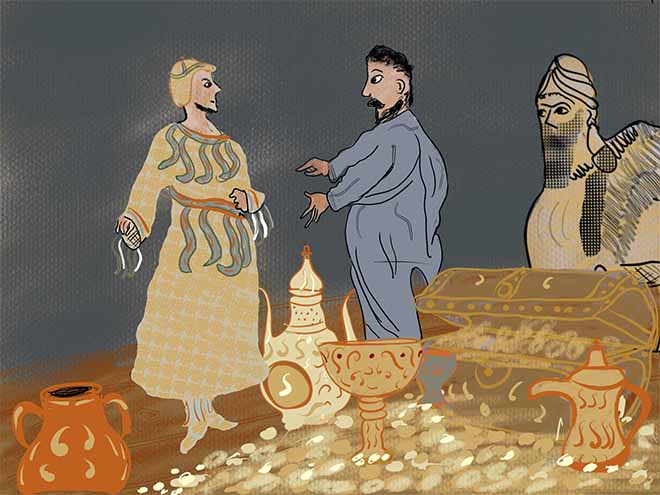Rich As Croesus : Untold Story of the King of Lydia Wealth

"Rich as Croesus": this expression known to all corresponds to an indisputable reality: the incredible wealth of Croesus, king of Lydia. But his terrible fate also recalls the morality of a certain fable: money does not buy happiness … as well as the origin of another well known expression : "Richer than Croesus".
Croesus, enemy of the Greeks
Most of what we know about Croesus comes from The Histories of Herodotus. This historian lived at the times of the last Persian wars (490-479 BC).
According to the "father of history", the Kingdom of Croesus, located in Lydia, a little further north inland, is close to the Greek cities of Asia Minor. And King Croesus, of course, wants to extend his power. He is thus described by Herodotus as "the first barbarian to have unjustly attacked the Greeks, forced some to pay him tribute, and made others his allies".
The ancestor's fault
To this is added a legend. If Croesus is the king of Lydia from 561, it is because his great-great-grandfather Gyges, bodyguard of King Candaules, assassinated his master and usurped power by marrying the queen. The Oracle of Delphi revealed that the descendants of Candaules would have their revenge in the fifth generation: this generation is that of Croesus. He does not seem to fear the prediction, which he cannot ignore. He launches a series of victorious expeditions against the Greek Ionians and island cities. He thus manages to annex huge territories to his state. Looting, tributes, taxes, the sale of citizens as slaves: this is the origin of Croesus' fortune. Its capital, Sardis, becomes a prestigious city. He had sumptuous palaces erected there and distributed large amounts of subsidies to attract a host of artists, philosophers and poets.
First warning
Lydian riches appear inexhaustible; in financial matters, Croesus imposes his law on the entire Mediterranean basin. King Croesus's finances are so superior to those of other powers that his monetary standard is imposed everywhere. He also considers himself the greatest and the happiest of men, and proclaims it ... A warning is inflicted on him when a character attracted by the pomp of the court presents himself in Sardis: the famous legislator Solon, considered as the father founder of Athenian democracy. Croesus shows him his palace and shows him his treasures. Then he asks him, "Have you ever seen someone who was the happiest of men?" The Athenian sage gave him the following answer:" You are, I see it well, very rich, and you reign over many subjects; but I cannot answer you until I have learned that your death was beautiful. For the rich man is by no means happier than the man who lives from hand to mouth, if the favor of fate does not remain faithful to him enough for him to end his career in full prosperity. In everything, we must consider the end because, to many men, heaven has shown happiness, only to then destroy them entirely."
The ambiguous oracle of the priestess
After this episode, in fact, fate seems to fall upon Croesus. He is first warned by a dream that his son Atys, commander of his armies, will perish with an iron point; despite all the precautions taken, the prediction comes true: Atys is killed in a hunting accident. Then Croesus must make an essential decision. Faced with the rise of the Persian Empire under Cyrus, he hesitates between negotiation and struggle. He will consult the Oracle of Delphi, not without having first covered the sanctuary with offerings: gold vases and cups, purple clothes and tunics, silver jar and craters, and even 117 bricks of pure gold… This display of presents must, he thinks, win him the favor of the god Apollo. However, the Oracle is ambiguous, since it only announces that a mighty empire will be defeated. Which? Croesus thinks it is the Persian, and he attacks.
Saved from the stake
It takes him badly, because, shortly after the first fights in Thymbra, the Persians invade Sardis by surprise and the King of Lydia is taken prisoner. Condemned to the stake and witnessing the sacking of his capital, he can ponder Solon the Sage on the fragility of human fortunes. But, intrigued to see Croesus whisper Solon's name, as the flames rise towards him, Cyrus orders the fire to be put out to have the story told. Troubled by this tale and fearing that it might later apply to himself if he sacrificed his victim, Cyrus takes pity on Croesus. He certainly does not give him back his kingdom, but makes him his advisor.









































































































































































































































































































































